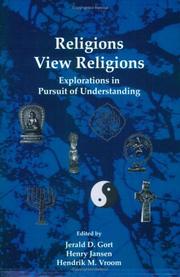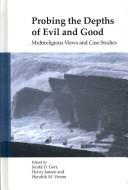| Listing 1 - 7 of 7 |
Sort by
|
Book
ISBN: 9789042032798 9789042032804 9042032804 1283009323 9781283009324 9042032790 9786613009326 6613009326 Year: 2011 Volume: 39 Publisher: Amsterdam [etc.] Rodopi
Abstract | Keywords | Export | Availability | Bookmark
 Loading...
Loading...Choose an application
- Reference Manager
- EndNote
- RefWorks (Direct export to RefWorks)
Can one maintain one's religious identity without closing oneself from the other? In general, Christian reflection on interreligious dialogue begins with a theological reflection on religious plurality that assumes that one cannot engage seriously in interreligious dialogue without a sound theology of religions. In this book, Marianne Moyaert critically assesses the various models for a Christian theology of religions (exclusivism, inclusivism, pluralism, particularism) by asking how these models relate to the dialogical tension between openness and identity. She argues that we need to overcome the classical theological approach of religious plurality and move in the direction of a theological hermeneutics of interreligious hospitality. To that end she turns to Paul Ricoeur, whose philosophical and hermeneutical insights can give a new turn to the discussion of the criteria, possibilities, and particularly the limits of interreligious dialogue.
Christian fundamental theology --- Academic collection --- 291.16 --- Verhouding tussen de godsdiensten. Verdraagzaamheid. Interreligieuze dialoog --- 291.16 Verhouding tussen de godsdiensten. Verdraagzaamheid. Interreligieuze dialoog --- Dialogue --- Religions --- Religious pluralism --- Pluralism (Religion) --- Pluralism --- Religion --- Interreligious relations --- Relations among religions --- Religious aspects --- Relations --- Christianity and other religions. --- Theology of religions (Christian theology) --- Theology, Doctrinal. --- Theology, Doctrinal --- Christian doctrines --- Christianity --- Doctrinal theology --- Doctrines, Christian --- Dogmatic theology --- Fundamental theology --- Systematic theology --- Theology, Dogmatic --- Theology, Systematic --- Theology --- Christianity and other religions --- Syncretism (Christianity) --- Doctrines --- History --- Religions. --- Open theism. --- Free-will theism --- God, Open view of --- God, Openness of --- Neotheism --- Open view of God --- Openness of God --- Openness theology --- Theism, Open --- Comparative religion --- Denominations, Religious --- Religion, Comparative --- Religions, Comparative --- Religious denominations --- World religions --- Civilization --- Gods
Book
ISBN: 9048551870 9463726837 Year: 2020 Publisher: Amsterdam : Amsterdam University Press,
Abstract | Keywords | Export | Availability | Bookmark
 Loading...
Loading...Choose an application
- Reference Manager
- EndNote
- RefWorks (Direct export to RefWorks)
God's diplomat, the pope of the ecumenical movement, but also an acerbic theologian and a difficult person: this is how journalists characterised Willem Adolf Visser 't Hooft (1900-1985). He was one of the best-known Dutch theologians outside the Netherlands and he left his mark on the world church. Even at an early age he made profound efforts in support of international ecumenical youth and student organisations (Dutch Student Christian Movement, YMCA and World Student Christian Federation). He led the World Council of Churches during its formative stages (from 1938), and after its formal establishment in 1948 became its first general secretary, serving until 1966. To Visser 't Hooft, the unity of the church was both an article of faith and of a pragmatic organisation of church influence in a disunited world.
History. --- BIOGRAPHY & AUTOBIOGRAPHY / Religious. --- Church renewal. --- Church unity. --- disappointment. --- globalisation. --- institutionalisation. --- reconciliation. --- Theologians --- Visser 't Hooft, Willem Adolph,
Book
ISBN: 1532607989 Year: 2017 Publisher: Eugene, Oregon : Wipf & Stock,
Abstract | Keywords | Export | Availability | Bookmark
 Loading...
Loading...Choose an application
- Reference Manager
- EndNote
- RefWorks (Direct export to RefWorks)
Book
ISBN: 9781532607974 1532607970 9781532607998 9781532607981 1532607989 1532607997 Year: 2017 Publisher: Eugene
Abstract | Keywords | Export | Availability | Bookmark
 Loading...
Loading...Choose an application
- Reference Manager
- EndNote
- RefWorks (Direct export to RefWorks)
Abraham, the father of all believers, plays host to three strangers, one of whom is God, and thus sets an example for others to follow. Jews, Christians, and Muslims often treat each other as strangers. Their Holy Books are not the cause of their conflicts and enmity but rather show the way to solve them. They tell a common story of the lifelong journey of the human being to the promised city, the promised land, and the promised world where justice and righteousness reign. -- Provided by publisher.
Book
ISBN: 9042028645 9789042028647 9042028637 Year: 2010 Publisher: Amsterdam New York, NY Rodopi
Abstract | Keywords | Export | Availability | Bookmark
 Loading...
Loading...Choose an application
- Reference Manager
- EndNote
- RefWorks (Direct export to RefWorks)
Christianity exists in relation to and interacts with its cultural environment in a number of ways. In this volume authors from a wide variety of backgrounds explore various facets of the relationship and interaction of Christianity with its cultural environment: politics, society, esthetics, religion and spirituality, and with itself. Divided into three main sections, Crossroad Discourses between Christianity and Culture looks at the interaction of Christianity with culture in the first section, with other religions and spiritualities in the second, and finally with itself in the third. The contributions engage in a critical examination of not only the culture in which Christianity finds itself but also in a critical examination of Christianity itself and its interaction with that culture. The editors hope that teachers, students, and readers in general will profit greatly from the critical articles contained in this book.

ISBN: 940120232X 1423790847 9781423790846 9789042018587 9042018585 9789401202329 Year: 2006 Publisher: Amsterdam Rodopi
Abstract | Keywords | Export | Availability | Bookmark
 Loading...
Loading...Choose an application
- Reference Manager
- EndNote
- RefWorks (Direct export to RefWorks)
Because religion is so central to the lives and experience of the vast majority of people throughout the world, it figures very prominently in a variety of ways in interhuman relations. Unfortunately, 'religion' often appears to be one of the potent sources of mistrust, discord and strife between and among individuals, groups and cultures. What frequently lies at the root of such suspicion and dissension is general ignorance concerning the religious other, a lack of knowledge about his or her beliefs, aspirations and views of the good and morally honorable life. And even if people have some factual knowledge about other religions, they regularly display little understanding of them and their adherents. Learning both to know and understand people of other faiths and their religions is absolutely requisite to the realization of paradigms of coherent and intelligent 'convivance,' that is, living together in sensible, peaceable and cooperative harmony. An effective agency for fostering such knowledge and understanding is the discipline of theology of religions, which examines how religions have and ought to view other religions. And it is particularly the practice of comparative theology of religions which bears the most promise in this regard. The present symposium consists of precisely this kind of comparative exercise and may be viewed as an important contribution to the development of a new project which endeavors to enlarge the horizon and broaden the focus and reflection of theology of religions as that has been gradually developed during the last few decades, a new enterprise, in other words, which seeks to universalize and mutualize theology-of-religions discourse. One of the important things this volume shows is that the views religions have of other religions differ from one another in very substantial ways, which is explained by the fact that they derive from diverging paradigms of faith, belief and ritual and specific cultural and social contexts. This textbook demonstrates how strongly different Hindu, Buddhist, Shinto and Confucian views are from those of Islam, Judaism and Christianity, which latter in turn also exhibit considerable differences among themselves. These differences are greater than people immersed in their own cultures often realize or expect. It is becoming ever more clear that ignorance of or disinclination to acknowledge or refusal to accept these real differences constitute major root causes of serious conflicts in the world. The essays in this book, written by representatives of the major world religions, offer descriptive and/or prescriptive appraisals of other religions in general or one other religion in particular from the perspective of the religion of the author concerned. It is hoped that this unique exercise in intercultural theology of religions will generate insights and new forms of understanding which can be used by religious leaders and other educators to help correct the disposition toward religious haughtiness, insularity and communalism and the dangerous leanings toward interreligious suspicion, antipathy and animosity which are all too often evident in our contemporary societies.
Religions --- Interreligious relations --- Relations among religions --- Comparative religion --- Denominations, Religious --- Religion, Comparative --- Religions, Comparative --- Religious denominations --- World religions --- Civilization --- Gods --- Religion --- Relations. --- Interfaith relations. --- Comparative studies.

ISBN: 9789042022317 9042022310 9781435612884 1435612884 9789401204620 9401204624 1282265784 9786612265785 Year: 2007 Publisher: Amsterdam Rodopi
Abstract | Keywords | Export | Availability | Bookmark
 Loading...
Loading...Choose an application
- Reference Manager
- EndNote
- RefWorks (Direct export to RefWorks)
In the few years since the attack on the World Trade Center on September 11, 2001, evil has become a central theme in the media and human consciousness: the evil of terrorism, the evil of secular culture, concern for poverty, and climate change... Yet different cultures and religious traditions have different ideas of what evil is and what its root causes are. Although there is no massive clash of cultures, many disagreements and also conflicts in the world arise from the deep differences in views of evil. This volume explores religious views of evil. Scholars from different religions and from various parts of the world describe how people probe the depths of evil—and by necessity that of good—from their own background in various worldviews. In their explorations, almost all address the need to go beyond morality, and beyond legalistic definitions of evil and of good. They point to the radical depths of evil in the world and in human society and reinforce our intuition that there is no easy solution. But if we can gain a better understanding of what people from other worldview traditions and cultures consider evil, we are that much closer to a more peaceful world.
Natural theology --- Comparative religion --- 216 --- Goed en kwaad --- Ethics. --- Good and evil --- Deontology --- Ethics, Primitive --- Ethology --- Moral philosophy --- Morality --- Morals --- Philosophy, Moral --- Science, Moral --- Philosophy --- Values --- Religious aspects.
| Listing 1 - 7 of 7 |
Sort by
|

 Search
Search Feedback
Feedback About UniCat
About UniCat  Help
Help News
News